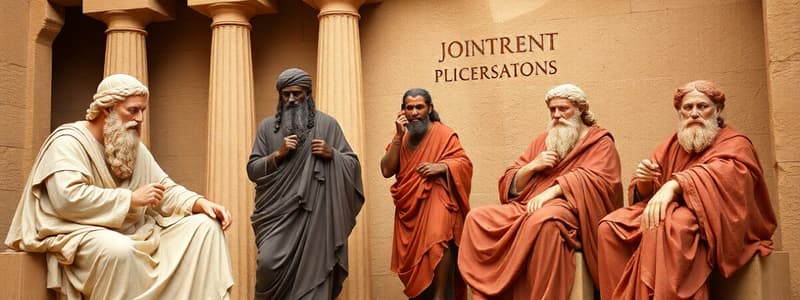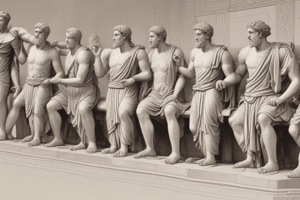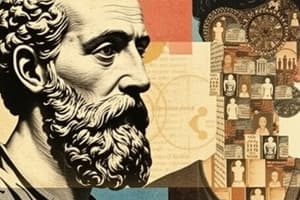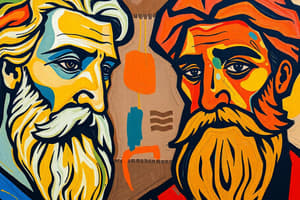Podcast
Questions and Answers
Which philosopher is credited with predicting a solar eclipse?
Which philosopher is credited with predicting a solar eclipse?
- Thales of Miletus (correct)
- Hippocrates
- Empedocles
- Claudius Ptolemy
What did Socrates believe was more important than physical beauty?
What did Socrates believe was more important than physical beauty?
- Knowledge (correct)
- Status
- Wealth
- Power
Which philosopher proposed the existence of four roots of elements?
Which philosopher proposed the existence of four roots of elements?
- Democritus
- Pythagoras
- Empedocles (correct)
- Hippocrates
What is the primary contribution of Aristotle to science?
What is the primary contribution of Aristotle to science?
What mathematical concept is Pythagoras best known for?
What mathematical concept is Pythagoras best known for?
What did Plato identify as the four essential qualities of a perfect state?
What did Plato identify as the four essential qualities of a perfect state?
What was Aristarchus's significant contribution to astronomy?
What was Aristarchus's significant contribution to astronomy?
Which title is attributed to Eratosthenes for his work in geography?
Which title is attributed to Eratosthenes for his work in geography?
What was the approximate circumference of the Earth as determined by Eratosthenes?
What was the approximate circumference of the Earth as determined by Eratosthenes?
Who is considered the father of plant science and authored 'History of Plants'?
Who is considered the father of plant science and authored 'History of Plants'?
Roman civilization is known as the 'Eternal City'.
Roman civilization is known as the 'Eternal City'.
The Roman roads were primarily built using wooden materials.
The Roman roads were primarily built using wooden materials.
Arabic civilization originated in the Arabian Peninsula around 622 BC.
Arabic civilization originated in the Arabian Peninsula around 622 BC.
Ibn Moosaa's work included 800 examples related to trigonometry.
Ibn Moosaa's work included 800 examples related to trigonometry.
The astrolabe was invented to observe weather patterns.
The astrolabe was invented to observe weather patterns.
Paper making was first developed in Central Asia by early Chinese scholars.
Paper making was first developed in Central Asia by early Chinese scholars.
The decimal system as we know it was first developed by the Egyptians.
The decimal system as we know it was first developed by the Egyptians.
The Muslims led advancements in industries like silk and pottery.
The Muslims led advancements in industries like silk and pottery.
Animal bones were used in ancient China for both writing and divination.
Animal bones were used in ancient China for both writing and divination.
The Great Mosque of Damascus was completed in the 5th century BC.
The Great Mosque of Damascus was completed in the 5th century BC.
Study Notes
Thales of Miletus
- Developed the theory of matter based upon water.
- Predicted a solar eclipse.
- One of the Seven Sages of Greece.
- Often considered the first philosopher in the Western tradition.
Socrates
- Classical Greek philosopher credited with laying the foundations of modern Western philosophy.
- Famous for creating the Socratic method.
- Believed the mind was more important than physical beauty.
- Sentenced to death by hemlock poisoning.
Empedocles
- Postulated that there were more than one kind of matter and proposed four elements: earth, air, fire, and water.
- Introduced two motive forces that separate the four elements: Love and Strife.
Hippocrates
- Founded the science of medicine and known as the greatest physician of antiquity.
- Believed diseases have natural causes and the body has the power to heal itself.
- Associated with the Hippocratic Oath, traditionally taken by newly graduated physicians.
Aristotle
- Regarded as the father of biology and zoology.
- Ancient Greek philosopher and scientist considered one of the greatest thinkers in politics, psychology, and ethics.
- Created the science of Formal Logic.
- Believed the Earth was the center of the Universe (geocentric theory) .
Archimedes
- Conducted experiments leading to the discovery of the lever and pulley, which enabled the invention of machines for moving loads.
- Calculated the value of pi.
- Coined the term "Eureka!"
Claudius Ptolemy
- One of the greatest astronomers who founded the Geocentric theory.
Democritus
- Developed the atomic theory, proposing that matter consisted of atoms.
Pythagoras
- Famous Greek mathematician and philosopher.
- Best known for the proof of the Pythagorean theorem, which relates to right-angled triangles.
- The Pythagorean theorem states that for any right-angled triangle, the square of the hypotenuse (the longest side) is equal to the sum of the squares of the other two sides (or "legs").
Plato
- Student of Socrates and teacher of Aristotle.
- Established the first university in Europe, which he called "The Akademia".
- Proposed that people could be divided into three main types:
- Farmers, tradesmen, and craftsmen.
- Soldiers and military leaders.
- Rulers and scholars.
- Believed the perfect state would possess four qualities: wisdom, courage, self-discipline, and justice.
Aristarchus
- Developed new theories about planetary orbits.
- Believed that while the Earth revolves around the Sun, it also spins on its axis as it orbits.
Hipparchus
- Considered the founder of trigonometry.
- Most famous for his discovery of precession of the equinoxes (the gradual shift in the Earth's axis).
- Determined the length of the month.
Eratosthenes
- Best known for his accurate measurement of the Earth's circumference.
- Calculated the circumference to be 28,000 miles, only 3,000 miles more than what we know today.
- Known as "The Father of Geography".
Theophrastus
- Considered the father of Plant Science (botany).
- Wrote "History of Plants", describing the forms, behavior, morphology, and properties of over 500 food and medicinal plants.
- Also wrote "Causes of Plants", describing grafting methods, seeds, the effects of temperature on plants, weather-soil relationships, and the taste and perfumes of plants.
Roman Civilization
- Location: Centered around the Mediterranean Sea, encompassing areas in Europe, Africa, and Asia.
- Government: Ruled by emperors.
- Nickname: Known as the "Eternal City."
- Technology: Utilized water power and watermills for tasks like milling cereals, sawing timber, and crushing ore.
- Infrastructure: Known for extensive use of aqueducts, dams, bridges, and amphitheaters.
- Timekeeping: Utilized sundials, even creating portable versions.
- Roads: Primarily built concrete roads for military purposes, creating nearly 30 military highways branching out from the city.
- Road Network: Constructed 372 roads, connecting 113 provinces.
Arabic Civilization
- Origin: Arabian Peninsula, Saudi Arabia, in 622 AD.
- Language: Arabic is both the written and spoken language of the Arabs.
- Arabic-Speaking Countries: Algeria, Bahrain, Comoro Islands, Djibouti, Egypt, Iraq, Jordan, Kuwait, Lebanon, Libya, Mauritania, Morocco, Oman, Palestine, Qatar, Saudi Arabia, Somalia, Syria, Tunisia, UAE, and Yemen.
- Religion: Islam, meaning "submission to the will of God."
- Prophet: God Allah revealed a series of revelations to Muhammad, a tradesman, forming the basis of the new faith.
- Mathematics: Ibn Moosaa's work, Hisaab- Al-Jab Wal Muqaabala (The Calculation of Integration and Equation), showcased 800 examples in the 8th century.
- Trigonometry: His work, translated from Arabic to Latin, became the primary textbook in Europe until the 16th century.
- Astronomy: Invented the Astrolabe, an instrument used to observe stars.
- Architecture: Built the Great Mosque of Damascus.
- Paper Making: One of the earliest skills attained by Muslims, with paper manufacturing starting in Samarqand as early as the 8th century CE.
- Industry: Led in weaving pools, silk production, pottery, jewelry, leather, and perfume industries.
Chinese Civilization
- Early Writing: Utilized animal bones for the earliest form of writing. These bones were also known as oracle bones due to their use in fortune-telling.
- Number System: Developed the decimal or base-10 number system.
- Abacus: Invented the abacus as a calculator, utilizing sliding beads for quick mathematical computations.
- Clock: Created the first clock for astronomical purposes. The clock featured a puppet that would hold up a plate indicating the time.
- Water Clocks: Used to chime every 15 minutes.
- Magnetic Compass: Created a wooden circle with markings and a magnetic spoon on top, initially used for religious purposes.
- Gunpowder: Scientists discovered gunpowder by mixing sulfur, charcoal, and potassium nitrate. This mixture explodes because it burns rapidly and releases expanded gases during combustion.
Studying That Suits You
Use AI to generate personalized quizzes and flashcards to suit your learning preferences.
Description
Explore the foundational ideas of early philosophers such as Thales, Socrates, Empedocles, Hippocrates, and Aristotle. This quiz covers their contributions to philosophy, medicine, and the understanding of matter. Test your knowledge on the legacies of these influential thinkers.




